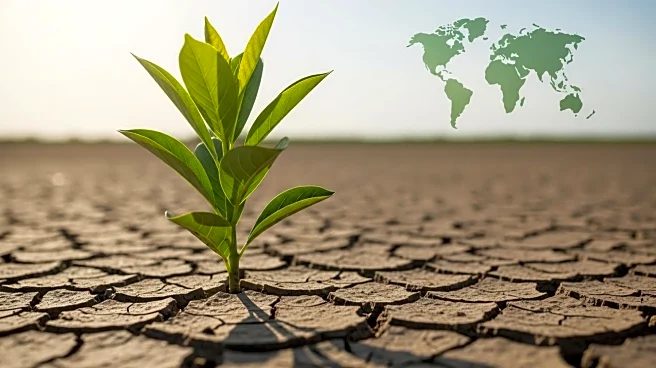What's Happening?
Simon Stiell, the UN climate chief, has expressed optimism about the global shift towards a green economy, citing China's success as an example. Ahead of a crucial summit in New York, Stiell emphasized the need for countries to present robust climate plans, known as nationally determined contributions (NDCs), to meet the Paris Agreement targets. Despite acknowledging that many countries, including the US, Russia, and Saudi Arabia, may fall short of the 1.5C target, Stiell believes the transition to a low-carbon economy is progressing. He highlighted the economic benefits of green energy investments, which surpassed fossil fuel investments last year. Stiell aims to shift the narrative from dire warnings to showcasing the economic opportunities of climate action.
Why It's Important?
The push for a green transition is critical as the world faces increasing climate-related challenges. The economic benefits of transitioning to renewable energy and low-carbon industries are substantial, with private sector investments reaching over $2 trillion last year. Countries that embrace this shift stand to gain economically, while those that resist may face severe economic repercussions. The climate crisis is already impacting global food prices and insurance costs, highlighting the urgent need for action. Stiell's call to action underscores the importance of aligning national policies with climate goals to ensure sustainable economic growth and mitigate the risks of climate inaction.
What's Next?
The upcoming Cop30 climate summit in Brazil will be a pivotal moment for countries to address the shortcomings in their climate plans and commit to stronger actions. Stiell and UN Secretary General António Guterres will continue to urge world leaders to present comprehensive NDCs. The focus will be on leveraging the economic benefits of climate action to drive policy changes. Countries like Australia and the EU, which have presented weaker NDCs, will need to reassess their commitments to align with scientific recommendations. The summit will also explore ways to enhance global cooperation and investment in green technologies.
Beyond the Headlines
The shift towards a green economy is not just about environmental benefits; it also presents significant opportunities for job creation, energy security, and improved public health. As countries invest in clean energy, they can stimulate economic development and enhance resilience against climate impacts. The narrative of climate action is evolving to include the positive economic and social outcomes, which may help garner broader support from governments and the public. The challenge lies in communicating these benefits effectively to drive meaningful change.









